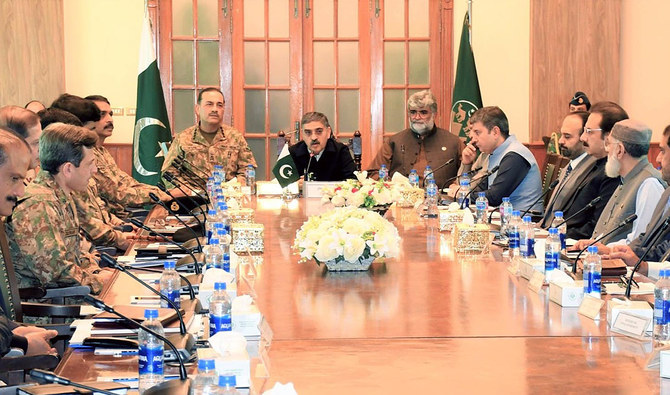ISLAMABAD: Pakistan’s army chief General Syed Asim Munir has said the military would provide “full support” to the government and law enforcement agencies in taking action against illegal activities that were causing pilferage of national resources and economic losses.
Pakistan launched an army-led nationwide crackdown against currency smugglers, hoarders, and black marketers in its bid to stave off an economic crisis that had significantly weakened the country’s national currency, causing its reserves to deplete and inflation to skyrocket to unprecedented levels. Following the crackdown, Pakistan has seen a marked improvement in its national currency.
The army is also working closely with the government as part of the Special Investment Facilitation Council (SIFC) that was set up in June to attract foreign investment, particularly from Gulf nations. The council has identified five sectors as priority, namely energy, agriculture, mining, information technology and defense production, as Pakistan deals with a balance of payments crisis and requires billions of dollars in foreign exchange to finance its trade deficit and repay its international debts in the current financial year.
“COAS [Chief of the Army Staff] highlighted that Army will provide full support in concert with LEAs and other government departments for enforcement actions against spectrum of illegal activities with full force to deny pilferage of resources and economic losses that the country suffers due to these activities,” Munir was quoted as saying in a statement from the prime minister’s office on Tuesday, after he visited Quetta with Caretaker Prime Minister Anwaar-ul-Haq Kakar and attended a meeting of the provincial apex committee.
The forum was briefed about a revised National Action Plan and operations against militant groups as well as efforts against smuggling and narcotics rings in Balochistan. The security of foreign nationals employed at projects run by Chinese companies as well as Pakistani state-owned and private firms was discussed, as was the repatriation of illegal immigrants, foreign currency regularization measures, and progress on SIFC initiatives in Balochistan.
“Initiatives taken by SIFC at federal level should have a trickledown effect in each province for the people of the area,” Kakar said.
“Balochistan is rich in mines and minerals and development in this sector will generate economic activity and job opportunities for the people of the area. Moreover, investments in agriculture and IT should also be focused apart from human resource development.”
The rupee hit a record low of 307.1 against the dollar on Sept. 5 but has made a sharp recovery since the country’s financial regulator and security agencies began taking action the next day to curb black market operations.
The crackdown on black market operators against the informal market has resulted in tens of millions of dollars pouring back into Pakistan’s interbank and open markets, dealers say.
A market-determined exchange rate is a key condition for Pakistan receiving a $3 billion bailout loan from the International Monetary Fund (IMF) that was agreed in July to help avert a sovereign default.
While there have been other attempts to curb the black market when the rupee has been under stress, the latest push came after licensed dealers requested the army chief to take action, rather than leave it solely to the civilian caretaker government that was put in place in August to run Pakistan till elections, currently expected to be held early next year.















